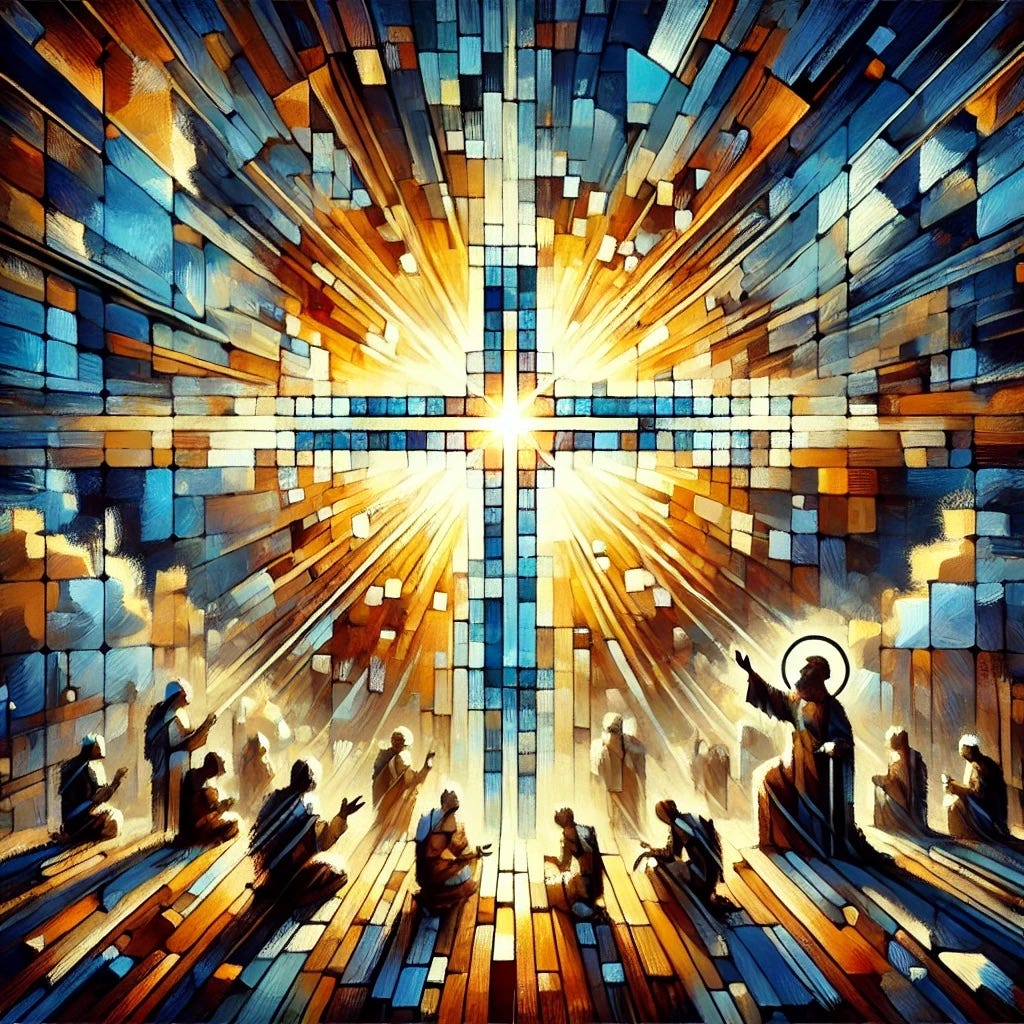Lutheranism as Platonic Theatre
The Babylonian Nets of Over-Dogmatization in a Flag-Waving Age
It Doesn’t Matter Whose Fault It Is
The net result of the over-dogmatization of Lutheran linguistics is the presentation of a sterilized Christ—not the living Logos who overthrows kingdoms, but a static symbol trapped in a Platonic theater, where doctrine becomes drama for the comfort of a select cast.
This theater offers parlor games for guilded men, secure in their pedigree, blind to their praxis. They recite the language of orthodoxy while their lives betray a pluralism they claim to condemn, a syncretism they pretend to fear, and a greed they disguise as stewardship.
In truth, they have forged idols from Lutheran jargon, semi-honestly acquired, polished with citations, but lacking the fire of repentance and the breath of the Spirit. They canonize language while marginalizing life, turning the Gospel into a taxonomy—clean, cataloged, and controlled.
But Christ is not sterilized.
The Word is not chained.
And the real danger is not linguistic precision, but precision without purity, orthodoxy without obedience, and confession without contrition.
The remnant must see through the illusion:
That a man may speak of grace while crucifying his brother;
That a church may condemn Rome while building her own Babel;
That a system may know the Creeds and lose the Cross.
1. On the Sterilized Christ in a Platonic Theater
"Having a form of godliness but denying its power."
— 2 Timothy 3:5
Context: Paul warns that in the last days, men will cloak their evil in religious formality. This sterilized Christ is not the crucified Lord who reigns, but a dead icon used for safe, polite theology.
Application: The “parlor game” culture of intellectualized Lutheranism mimics godliness but neuters its confrontation with real darkness, real demons, and real grace.
2. On Men Who Ignore Their Own Pluralism, Syncretism, and Greed
"They speak lies in hypocrisy, having their own conscience seared with a hot iron."
— 1 Timothy 4:2
Context: Paul addresses false teachers who delude others while refusing to see their own corruption.
Application: These men condemn syncretism and pluralism while practicing both—in their ecumenical cowardice, in their silence for pay, in their exegesis traded for social club harmony.
3. On Forging Idols from Lutheran Jargon
"This people draws near to Me with their mouth, and honors Me with their lips, but their heart is far from Me. And in vain they worship Me, teaching as doctrines the commandments of men."
— Isaiah 29:13 (quoted by Christ in Matthew 15:8–9)
Context: God indicts His people for substituting human tradition for divine command, hiding behind language while denying lordship.
Application: Lutheran vocabulary, when used to guard power, maintain factions, or defend self-made kingdoms, becomes an idol—just as dangerous as Rome’s indulgences.
The overextension and equivocation of the word CHURCH (kirke) has become a prime strategy of confusion in weaponized language that veils rather than serves as a vessel of true communion. Such “theology,” such “talk about ‘the church’” is spoken with a brash confidence that means many things and nothing at once: the people, the building, the service, the office, the institution, the fellowship, the synod, the brand, the hierarchy, the history, the bureaucracy—and therefore, none of them with clarity, conviction, or cross.
Listen, and You Will See
What began as ecclesia—the called-out ones gathered by the Word and Sacrament in the name of Jesus Christ—has been rebranded into a motte-and-bailey citadel of shifting meaning. Whenever rebuked or challenged, defenders retreat to the motte: “But the church is just the people of God.” When asserting control or demanding submission, they advance from the bailey: “You must obey the Church”—now meaning the bylaws, the budget, the bishops, or the brand.
It is a bait and switch of divine proportions, not because God ordained it, but because men have presumed to speak in His name without fear. They appeal to power that does not exist, except in theory, tradition, or unquestioned assumption. They invoke “the Church” to bind consciences, not realizing that a voice that does not proclaim Christ crucified for sinners has no authority from heaven.
Like the scribes and Pharisees of old,
they “sit in Moses’ seat” but do not lift a finger to carry the burden (Matthew 23:2–4).
Like the sons of Eli,
they profane the offering while dressing in robes of remembrance (1 Samuel 2:12–17).
And like the Laodiceans,
they say “I am rich, have become wealthy, and have need of nothing”—
not knowing they are wretched, miserable, poor, blind, and naked (Revelation 3:17).
Scripture Anchors
1. On the Confusion of Speech and Meaning
“Woe to those who call evil good, and good evil; who put darkness for light, and light for darkness.”
— Isaiah 5:20
Application: The semantic drift of “church” cloaks disobedience in assumed holiness.
2. On Bait and Switch Authority
“They bind heavy burdens, hard to bear, and lay them on men’s shoulders; but they themselves will not move them with one of their fingers.”
— Matthew 23:4
Application: False appeals to “the Church” demand submission but offer no spiritual help.
3. On Theoretical Power Without Substance
“Having a name that you are alive, but you are dead.”
— Revelation 3:1
Application: Institutions that invoke “Church” without repentance or truth are hollow.
The Antidote: Ecclesiology According to the Word Alone
1. The Word Is Pure and Wise (AC XXVIII)
“Every word of God is pure; He is a shield to those who put their trust in Him.”
— Proverbs 30:5“The fear of the LORD is the beginning of wisdom, and the knowledge of the Holy One is understanding.”
— Proverbs 9:10
Here is the Church's first boundary: She is where the pure Word is heard and feared, where the wise are gathered and the foolish are exposed. The ecclesia is not first a place, but a people united in reverent listening to the voice of God.
The Word builds, divides, and gathers. The Word distinguishes the wise from the fool. The Word does this before a building, before a title, before a denomination. All other structures are scaffolding.
2. The Definition: The Word Creates the Church (AC XII)
“Faith comes by hearing, and hearing by the word of God.”
— Romans 10:17
The true Church is the congregation called by the Spirit through the living Word of God. She exists where the Word is preached in truth and the Sacraments are administered according to Christ’s command. This is not an abstract ideal—it is a tangible boundary.
Thus, no council, no constitution, no cathedral, and no clerical order defines the Church.
If the Word of Christ is not present and believed,
there is no Church,
no matter how historic,
how liturgical,
how synodically approved.
The Church is where the Word is heard. Not where it is merely recited. Not where it is shelved. Not where it is distorted by fear or buried under jargon. It is heard when men listen with fear, speak with clarity, and act with repentance. A people gathered around that Word in truth—even two or three—is Church.
3. The Discipline: The Word Divides the Church (AC XV)
“My word is like a fire... and like a hammer that breaks the rock in pieces.”
— Jeremiah 23:29“For the word of God is living and powerful... discerning the thoughts and intents of the heart.”
— Hebrews 4:12
The Word does not merely gather—it sifts. This is the forgotten mark of the Church: judgment begins in the house of God (1 Peter 4:17). Any church that refuses to be judged by the Word has ceased to be a church and become a tower of Babel masquerading as Zion.
4. Christ Is the Only Foundation (AC III)
“For no other foundation can anyone lay than that which is laid, which is Jesus Christ.”
— 1 Corinthians 3:11“Where two or three are gathered in My name, there I am in the midst of them.”
— Matthew 18:20
The Church exists where Jesus Christ is named and known as the Crucified and Risen One, and where His Word is rightly received. That is the foundation—not tradition alone, not episcopacy alone, not seminary alone, not liturgy alone. All these may serve as scaffolding, but if they are mistaken for the structure, they become idols.
5. The Fellowship: The Word Builds the Body (AC V)
“They continued steadfastly in the apostles’ doctrine and fellowship, in the breaking of bread, and in prayers.”
— Acts 2:42
This fourfold rhythm defines the visible shape of Christ’s Church:
Doctrine → Truth rightly taught.
Fellowship → Communion in the Spirit, not bureaucracy.
Breaking of Bread → The Supper, central and frequent.
Prayers → Corporate humility and dependence.
This is not institutionalism. It is incarnational order, built not on power, but on presence. Not on hierarchy, but on mutual submission under Christ.
6. The Glory: The Word Alone Gives Authority (AC IV)
“He who hears you hears Me.”
— Luke 10:16
“If they do not speak according to this word, it is because there is no light in them.”
— Isaiah 8:20
The authority of the Church is the authority of the Word alone. When the Church speaks only what Christ has commanded, she speaks with heaven’s authority. When she speaks from herself, she is no longer light, but darkness calling itself good.
This is why the Church must be continually reformed by the Word, not merely guarded by traditions.
This is why pluralism, syncretism, and greed must be burned out by Scripture’s fire.
This is why the true Church is never safe, never tame, never a theory—but always a living communion of saints under the crucified and risen King.
7. Shepherds Are Servants, Not Lords (AC XIV)
“Nor be called teachers; for One is your Teacher, the Christ. But he who is greatest among you shall be your servant.”
— Matthew 23:10–11“Shepherd the flock of God which is among you, serving as overseers… not as being lords over those entrusted to you, but being examples to the flock.”
— 1 Peter 5:2–3
True ecclesiology requires repentant pastors, not religious managers. The pastor is not the master of the Church but the servant of the Word. Any authority not derived from the Word and accountable to it is illegitimate. Shepherds serve by dying, not by ruling from theoretical seats of control.
8. The Church Is Always a Remnant (AC VII/VIII)
“Unless the LORD of hosts had left to us a very small remnant, we would have become like Sodom.”
— Isaiah 1:9“They are not all Israel who are of Israel.”
— Romans 9:6
Biblically, the Church is never the crowd, the power bloc, the empire. It is the remnant—the small, the faithful, the often despised. The false church grows fat and forgets. The true Church clings to the Word like a candle in the wind.
Summary: Seven Ecclesial Pillars of Scripture Alone
The Word is Pure (Proverbs 30:5) AC XXVIII
The Word Gathers (Romans 10:17) AC XII
The Word Separates (Hebrews 4:12) AC XV
The Word is Christ Who Commands (Matthew 18:20) III
The Word Alone Gives Authority (Isaiah 8:20) V
The Fellowship is in the Word (Acts 2:42) AC IV
The Word Exposes False Shepherds (Jeremiah 23:21–22) XIV
The Word Makes Holy (Isaiah 1:9; cf. John 17:17) VII/VIII











Thank you for helping me grow in my knowledge and faith…and in turning Chat into an educational tool!
The Seven Ecclesial Pillars of Scripture Alone naturally flow from-and reinforce-the classic attributes
of Scripture that have been confessed by the Church, especially in the Lutheran tradition. These attributes
define what Scripture is, while the seven pillars describe what Scripture does in the life of the Church. They are two sides of the same coin:
Scripture's nature and Scripture's function.
1. Inerrant (Without Error) - Proverbs 30:5
Connected Pillar: #1 - The Word is Pure. The Word can be trusted in all things; it is pure and unchanging.
2. Infallible (Cannot Fail) - Isaiah 55:11
Connected Pillars: #2 - The Word Gathers; #8 - The Word Makes Holy
God's Word always accomplishes its purpose, gathering and sanctifying.
3. Efficacious (Powerful to Do What It Says) - Hebrews 4:12
Connected Pillars: #3 - The Word Separates; #6 - The Fellowship is in the Word; #7 - The Word Exposes False Shepherds
Scripture divides truth from error, builds the Church, and judges false teachers.
4. Inspired (God-breathed) - 2 Timothy 3:16
Connected Pillars: #4 - The Word is Christ Who Commands; #5 - The Word Alone Gives Authority
Scripture comes directly from God, and therefore holds divine authority.
5. Clear (Perspicuous) - Psalm 119:105
Connected Pillars: #5 - The Word Alone Gives Authority; #7 - The Word Exposes False Shepherds.
The clarity of Scripture allows for discernment and true doctrine.
6. Sufficient (Needs No Supplement) - 2 Timothy 3:17
Connected Pillars: #1, #4, #6
The Word is all-sufficient for doctrine, life, and the Church's fellowship.
7. Wondrous (Holy and Transformative) - Psalm 119:18
Connected Pillars: #2 - The Word Gathers; #3 - The Word Separates; #8 - The Word Makes Holy Scripture inspires awe, brings the dead to life, and sanctifies the faithful
All glory be to God. God's peace be with you. Amen.